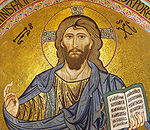- Christianity in Saudi Arabia
-
Christianity by Country
North AmericaSouth AmericaOceaniaAccurate religious demographics are difficult to obtain in Saudi Arabia[1] but 85 to 90% of citizens of Saudi Arabia are Sunni Muslims, who predominantly subscribe to the Government-sanctioned interpretation of Islam, while 10 to 15% of citizens are Shi'a Muslims.[1]
Contents
History
Christians had formed churches in Arabia prior to the time of Muhammad in the 7th century. Purportedly, one of the earliest church buildings ever discovered by archaeologists is located in Saudi Arabia, known as Jubail Church, built around the 4th century.[citation needed] Some parts of modern Saudi Arabia (such as Najran) were predominantly Christian until the 7th to 10th century, when most Christians were expelled, or converted to Islam. Some Arabian tribes, such as Banu Taghlib and Banu Tamim, followed Christianity. As a result of their help to Muhammad in his conquest of Arabia the Banu Taghlib were allowed to keep their Christian faith and their status as Arabs if they paid double poor tax, (Zakat) and promised not to baptize their children.[citation needed] However, they convinced their overlords that the prohibition against baptizing was neither realistic nor necessary and continued to baptize them anyway.[citation needed]
The old Christian community of Najran in southern Arabia went into conflict with the Jewish rulers of Yemen around 4th to 5th century.[citation needed]
Christian community today
There are more than a million Roman Catholics in Saudi Arabia, most of them are expatriates Filipinos and Indians who work there, but who do not have the citizenship of Saudi Arabia.[1][2] The percentage of Christians of all denominations among the about 1.2 million Filipinos in Saudi Arabia likely exceeds 90%.[3] There are also Christians from India, Pakistan, Bangladesh, Sri Lanka, Indonesia, Malaysia, Thailand, Ethiopia, Nigeria, Kenya and as well a number of Christians from sub-Saharan countries who are working in the Saudi Kingdom.[3]
Saudi Arabia allows Christians to enter the country as foreign workers for temporary work, but does not allow them to practice their faith openly. Because of that Christians generally only worship in secret within private homes.[3] Items and articles belonging to religions other than Islam are prohibited.[3] These include Bibles, crucifixes, statues, carvings, items with religious symbols, and others.[3]
The Saudi Arabian Mutaween (Arabic: مطوعين), or Committee for the Propagation of Virtue and the Prevention of Vice (i.e., the religious police) prohibits the practice of any religion other than Islam.[3] Conversion of a Muslim to another religion is considered apostasy,[3] a crime punishable by death (Capital punishment in Saudi Arabia) if the accused does not recant.[3] The Government does not permit non-Muslim clergy to enter the country for the purpose of conducting religious services.[3]
International Christian Concern (ICC) protested what it reported as the 2001 detention of 11 Christians in Saudi Arabia, for practicing their religion in their homes.[4] In June 2004, ICC reported on what it termed a "pogrom-like" crackdown by Saudi police on Christians after media reports of Koran desecration in Guantanamo Bay.[5]
Christians, and other non-Muslims, are prohibited from entering the cities of Mecca and Medina, Islam's holiest cities.[3]
Churches
Currently there are no official churches in Saudi Arabia of any Christian denomination.[3] The small number of Saudi Arabian Christians meets in internet chat rooms and private meetings.[3] Foreign Christians may meet at church meetings held at one of several embassies after registering and showing their passport to prove foreign nationality, or by private assemblies in school gyms located in gated communities on Aramco grounds. They can also hold services in each others houses.
Demographics
The percentage of Saudi Arabian citizens who are Christians is officially zero,[6] as Saudi Arabia forbids religious conversion from Islam (Apostasy) and punishes it by death (Capital punishment in Saudi Arabia).[3][7]
See also
- Human rights in Saudi Arabia
- Freedom of religion in Saudi Arabia
- Roman Catholicism in Saudi Arabia
- Orthodox Christianity in Saudi Arabia
- Protestantism in Saudi Arabia
- Capital punishment in Saudi Arabia
References
- ^ a b c International Religious Freedom Report 2009 - Saudi Arabia
- ^ Giuseppe Caffulli (September 7, 2004). "A catacomb Church? Perhaps, but one that is alive and well . . . and universal". AsiaNews.it. http://www.asianews.it/index.php?l=en&art=1436. Retrieved 2008-11-21.
- ^ a b c d e f g h i j k l m International Religious Freedom Report 2008 - Saudi Arabia
- ^ Human Rights Watch World Report, 2003. Human Rights Watch. 2003. http://books.google.com/books?id=oFmIOWMjYhsC&pg=PA478&dq=%22International+Christian+Concern%22&hl=en&ei=cXvyTYWBLcO4tweC8pCRBw&sa=X&oi=book_result&ct=result&resnum=4&ved=0CDwQ6AEwAzgU#v=onepage&q=%22International%20Christian%20Concern%22&f=false. Retrieved June 10, 2011.
- ^ Saudi Arabia : friend or foe in the war on terror?: Hearing before the Committee on the Judiciary. November 8, 2005. http://books.google.com/books?id=9P3nTVX4HisC&pg=PA78&dq=%22International+Christian+Concern%22&hl=en&ei=1nnyTYyuFoODgAeC97z0Cw&sa=X&oi=book_result&ct=result&resnum=2&ved=0CDAQ6AEwATgK#v=onepage&q=%22International%20Christian%20Concern%22&f=false. Retrieved June 10, 2011.
- ^ Central Intelligence Agency (April 28, 2010). "Saudi Arabia". The World Factbook. https://www.cia.gov/library/publications/the-world-factbook/geos/sa.html. Retrieved 2010-05-22.
- ^ Cookson, Catharine (2003). Encyclopedia of religious freedom. Taylor & Francis. p. 207. ISBN 0415941814. http://books.google.de/books?id=R0PrjC1Ar7gC&pg=PA207#v=onepage&q=&f=false.
 Saudi Arabia topics
Saudi Arabia topics- Index
- Outline
History 
Geography Law Politics - King
- Cabinet
- Allegiance Council
- National Security Council
- Consultative Assembly
- Foreign relations
- Nuclear program
- Mabahith (secret police)
Military Economy Society Culture Symbols Christianity in Asia Sovereign
states- Afghanistan
- Armenia
- Azerbaijan
- Bahrain
- Bangladesh
- Bhutan
- Brunei
- Burma (Myanmar)
- Cambodia
- People's Republic of China
- Cyprus
- East Timor (Timor-Leste)
- Egypt
- Georgia
- India
- Indonesia
- Iran
- Iraq
- Israel
- Japan
- Jordan
- Kazakhstan
- North Korea
- South Korea
- Kuwait
- Kyrgyzstan
- Laos
- Lebanon
- Malaysia
- Maldives
- Mongolia
- Nepal
- Oman
- Pakistan
- Philippines
- Qatar
- Russia
- Saudi Arabia
- Singapore
- Sri Lanka
- Syria
- Tajikistan
- Thailand
- Turkey
- Turkmenistan
- United Arab Emirates
- Uzbekistan
- Vietnam
- Yemen
States with limited
recognition- Abkhazia
- Nagorno-Karabakh
- Northern Cyprus
- Palestine
- Republic of China (Taiwan)
- South Ossetia
Dependencies and
other territories- Christmas Island
- Cocos (Keeling) Islands
- Hong Kong
- Macau
Categories:
Wikimedia Foundation. 2010.

